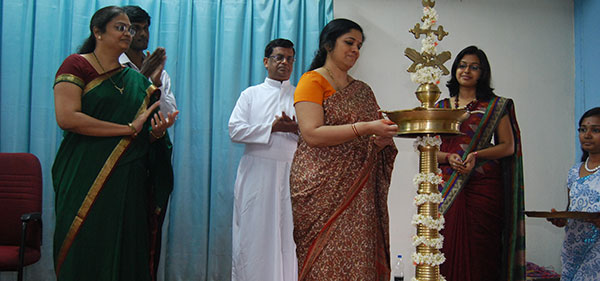Seminar / Conference
National Conference on “Neurohumanities: Convergence of Literature, Art, and Cognition”
Date: 18 & 19 September 2025
The Department of English, School of Humanities and Social Sciences, Kristu Jayanti Deemed to be University, in collaboration with Bangalore Baptist Hospital, organized a National Conference on “Neurohumanities: Convergence of Literature, Art, and Cognition” on 18–19 September 2025. The inaugural ceremony began with the lighting of the lamp by the Chief Guest, Dr. R. Spurgeon, along with Rev. Fr. Dr. Augustine George (Vice Chancellor), Fr. Joshy Matthew (Director, School of Humanities and Social Sciences), Dr. Gopakumar A.V. (Dean, School of Humanities and Social Sciences), and Dr. Sredevi Santhosh (Head, Department of English), symbolizing the commencement of an enriching academic journey.
In his Presidential Address, Rev. Fr. Dr. Augustine George highlighted the importance of interdisciplinary engagement in bridging the humanities and sciences. Dr. R. Spurgeon, in his keynote remarks, underscored the transformative potential of Neurohumanities in deepening our understanding of cognition, creativity, and cultural expression. Over two days, the conference convened academicians, researchers, and professionals for paper presentations, keynote addresses, and interactive discussions on the intersections of cognitive sciences and the humanities, with a particular focus on how literature and art shape human cognition and consciousness. The keynote sessions featured eminent scholars, including Prof. Rukmini Bhaya Nair (IIT Delhi; Global Professional Fellow, QMUL) on “From the Arts to AI: The Evolution of the Brain, the Enigma of Beauty, and the Beasts of Emotion”; Prof. Ramesh Kumar Mishra (University of Hyderabad) on “Cognitive Science and Art: The Specific Case of Vision and Affect”; Dr. Ajit K. Mishra (IIT BHU Varanasi) on “Mapping the Mind through Literature: Narrative and the Neural Self”; and Dr. Sumanth S (Bangalore Baptist Hospital) on “Default Mode Network – Insights from Neuroscience.” The conference served as a vibrant platform for interdisciplinary exchange, offering participants fresh perspectives, fostering scholarly dialogue, and encouraging collaborative approaches in advancing the emerging field of Neurohumanities.
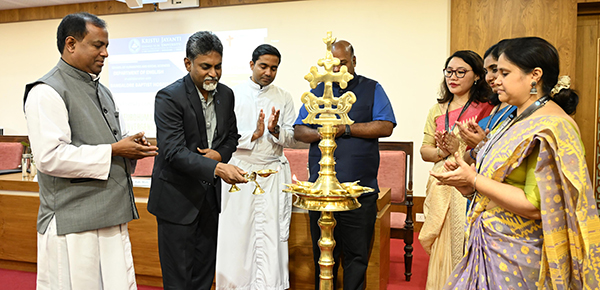
International Conference: Asia’s Maritime History and Identity at Cultural Crossroads
Date: 23 & 24 January 2025
The Department of English in collaboration with the University of Auckland, New Zealand hosted a two-day international conference titled “Asia’s Maritime History and Identity at Cultural Crossroads” on 23 & 24 January 2025. The conference addressed the absence of academic discourses and cultural productions surrounding complex oceanic-ecosystems. Several experts from the field came together to explore maritime histories tangentially engaging with identities and cultures that define Asia’s coastal and oceanic landscapes. The conference was inaugurated by the distinguished Shaurya Chakra Col. Dr. DPK Pillay, Former Senior Defence Specialist and Planning Officer Defence Ministry and Research Fellow at Manohar Parikkar Institute for Defence Studies and Analyses, New Delhi. Fr. Dr Lijo P. Thomas, Vice Principal, Kristu Jayanti College, presided over the event, emphasised that the insights from the conference would help navigate our complex identities of today. In his keynote speech, Col. Dr. DPK Pillay addressed the interconnectedness of different Asian civilisations through trade, exploration, and the movement of people. Prof. Dr. Mark Barrow, Dean, Faculty of Arts and Education, University of Auckland, Fr. Joshy Mathew, Head of the Department of English, Dr. Lyola Thomas and Prof. Jerrin Jose, the coordinators of the Department also addressed the gathering.
The conference featured distinguished resource persons including, Dr. Esther Fitzpatrick, Director of the Graduate Diploma in Teaching, University of Auckland, New Zealand, Dr. Maya Vinai, Associate Professor, Department of Humanities and Social Sciences, BITS and Dr. Louiza Rodrigues, University of Mumbai, Dr. Radhika Seshan, Retired Professor & Head of the Department of History, Savitribai Phule Pune University and Visiting Faculty, Symbiosis School of Liberal Arts, Pune and Dr. Sayan Dey Assistant Professor, Department of English Studies, Bayan College, Oman.
The conference was a dynamic platform for the exchange of ideas drawing over 450 attendees and 230 paper presentations across diverse disciplines, including history, sociology, political science, cultural studies and English literature.
The conference also featured a captivating exhibition of the curated works of Paul Fernandes and art installations by students which enriched the event by offering a unique visual perspective on maritime history. By retreading the history of maritime Asia the conference led to a transdisciplinary engagement bridging the local to the planetary and raising environmental consciousness.
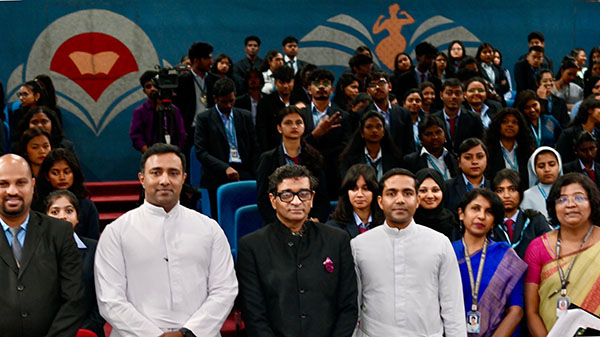
National Conference: Neo-Colonialism: Representing Narratives, Realities and Responses
Date: 08 & 09 November, 2024
The Department of English at Kristu Jayanti College, Autonomous, Bengaluru, in collaboration with the Department of English, St. Aloysius (Deemed to be University), Mangalore, organised a National Conference titled “Neocolonialism: Re-Presenting Narratives, Realities, and Responses” on 8th & 9th November, 2024. The conference, aimed at highlighting the pervasive influence of neocolonialism across various levels of society. The conference was presided over by Rev. Fr. Dr. Augustine George, Principal, Kristu Jayanti College, and inaugurated by Rev. Dr. Praveen Martis, SJ, Vice Chancellor of St. Aloysius (Deemed to be University), Mangalore. In his presidential address, Rev. Fr. Dr. Augustine George, emphasised the importance of revitalising the Indian Knowledge System through scholarly discussions and research. He advocated for a return to India’s rich cultural heritage in alignment with the Viksit Bharat initiative proposed by the Prime Minister. Similarly, Fr. Dr. Praveen Martis SJ, expressed appreciation for the conference theme, underscoring the pervasive influence of Western dominance in modern global contexts and its substantial impact on cultural and economic landscapes worldwide. He reiterated the need for both learning and unlearning Indigenous Knowledge to foster meaningful connections with cultural roots in a globalised world. Participants further engaged with the conference theme through three keynote addresses, a panel discussion, and paper presentation sessions.
After the inauguration, Dr. Nanda Kishor MS, Head, Associate Professor Department of Political Science and International Studies, Pondicherry, Central University delivered the Keynote Session: I on ‘Neocolonialism through Resource Control, Geopolitical Power Structures and Alliances in the Contemporary World Order’. Dr. Kishor, provided a comprehensive overview of the historical origins of the term ‘Neocolonialism,’ discussed the contributions of prominent thinkers such as Kwame Nkrumah, examined the ongoing exploitation and control of African nations by Western powers, and introduced the dependency theory as a framework for understanding these dynamics. Keynote Session II: tilted ‘Beyond ‘mystification’ or ‘the last stage of imperialism’: Reassessing Neocolonialism au-delà Sartre (1956, 1964) and Nkrumah (1965)’ was delivered by Dr. Saugata Bhaduri, Professor, Centre for English Studies, Jawaharlal Nehru University, New Delhi, who offered a nuanced exploration of Neocolonialism, tracing its intellectual roots and critically analysing the contributions of influential theorists Jean-Paul Sartre and Kwame Nkrumah.
A thought-provoking Panel Discussion on the conference theme was moderated by Dr. D. Suba Chandran, Professor & Dean, School of Conflict and Security Studies, NIAS. The panel featured distinguished experts: Dr. Shaji S, Associate Professor at the University of Hyderabad; Dr. Nanda Kishor M S, Head of the Department of Politics and International Studies, Pondicherry Central University; Prof. Dr. Heribert Dieter from the SWP, German Institute for International and Security Affairs, Berlin; and Ms. Rohini Rheenum, Ph D Scholar at NIAS. The discussion explored the multifaceted dimensions of neocolonialism, examining its historical roots, contemporary manifestations, and the impact on global geopolitics. Dr. Shaji S focused on the intersection of neocolonialism and global power structures, while Dr. Nanda Kishor emphasised the socio-political responses in postcolonial nations. Prof. Dr. Heribert Dieter, provided a European perspective, analysing how neocolonial dynamics shape global security policies. Ms. Rohini Rheenum drew attention to the role of technology and digital neocolonialism in contemporary international relations.
Day two of the conference included a Keynote Session III on ‘From Neocolonialism to Coloniality: Representations and Challenges’ by Dr. Payal Pal Associate Professor of English, Humanities and Social Sciences, LNM Institute of Information Technology, Jaipur, that was held on 9th November, 2024. Dr. Pal discussed how colonial legacies have entrenched social hierarchies, manifesting as economic, racial, and cultural inequalities, and emphasised the need to shift curriculum content away from its imperial roots. Twenty-three Parallel Paper Presentation sessions were conducted in online and offline mode. The conference was a resounding success with 249 external participants and offered a nuanced understanding of the theoretical underpinnings of Neocolonialism and an insight into applying neo-colonial theories to contemporary issues.
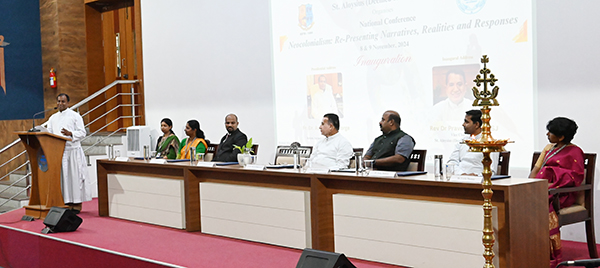
National Seminar on “Reviving the Indian Knowledge System: Integrating Ancient Wisdom with Contemporary Practices.”
Date: 25 February, 2024
The Department of English at Kristu Jayanti College hosted a national seminar titled “Reviving the Indian Knowledge System: Integrating Ancient Wisdom with Contemporary Practices.” The seminar focused on reviving India's rich heritage, aiming to blend traditional knowledge with modern cultural and academic practices. Participants included scholars and professionals from diverse fields who discussed the relevance and integration of ancient Indian traditions. The seminar featured four plenary sessions, each was led by experts in different fields. Rev. Fr. Joshy Mathew, Head of the English Department, opened the event by highlighting India’s knowledge systems which is rooted in Vedic traditions. Following this, Rev. Fr. Dr. Augustine George, Principal of Kristu Jayanti College, emphasized on the need to incorporate Indian Knowledge Systems into modern academia, encouraging active engagement in preserving this heritage. The inaugural address was delivered by Padmashri Dr. Sharada Srinivasan from the National Institute of Advanced Studies, who discussed on the aspect of inclusivity and cultural depth of Indian heritage by using examples like the Nataraja statue, Iron Pillar, and yoga to illustrate the symbiotic relationship between Indian art, technology, and culture. Overall, the seminar served as an intellectual forum, revisiting India’s ancient knowledge systems and exploring ways to incorporate them thoughtfully into modern practices.
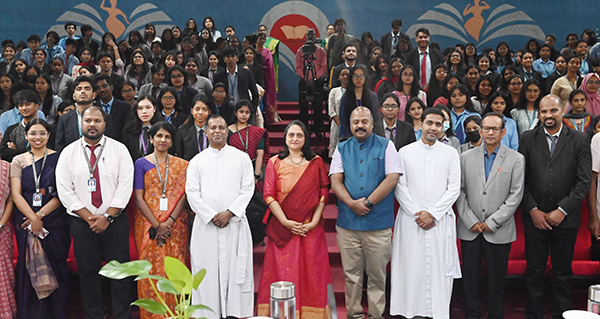
International Seminar on Indigenous Realities: Culture, Identity and Resilience in the Global Context
Date: 27 February, 2024
Department of English organized an International Seminar titled “Indigenous Realities: Culture, Identity and Resilience in the Global Context” on 27 February 2024 at A2 Auditorium, third floor of Admin Block, Kristu Jayanti College. The keynote speaker was Mr. Kotiganahalli Ramaiah Poet, Playwright, Philosopher, Cultural activist, a Sahitya Academy Awardee and Karnataka Rajyotsava Awardee. The speaker commenced the session with an overview of various indigenous communities and some of the challenges faced by them. He recited three poems written by him in audience. These poems served as a metaphor for his self-identity as he too belongs to indigenous communities. The resource person demonstrated a profound commitment to amplify indigenous voices advancing social justice. The session elaborated on Dalit feminism, the life of untouchables seeking for individual identity. The session was highly informative as it focused on the various challenges faced by the indigenous communities. The session was interactive with the audience taking an active part in understanding the process to be undertaken. There were three Plenary sessions followed by the inaugural session. The speakers were Karundhel Rajesh, Screenwriter and script consultant, Tamil Nadu, Dr. Esther Fitzpatrick, Senior lecturer, School of Learning, Development and Professional Practice, Faculty of Education, The University of Auckland and and Dr. Sugi G, Assistant Professor, Department of English, Stella Maris College(Autonomous), Chennai.
Panel Discussion speakers were Karundhel Rajesh, Screenwriter and script consultant, Tamil Nadu, Dr. Hemavathi B S, Assistant Professor, Department of English, Dr. S. Gopalaraju First Grade College, Anekal, Dr. Mekhala Venkatesh, Associate Professor and Research Guide, Department of English, Jain (Deemed to be) University, Bengaluru, Padmashree Anandhan, Project Associate, National Institute of Advanced Studies, IISC Campus, Bengaluru, and Dr. Sugi G, Assistant Professor, Department of English, Stella Maris College(Autonomous), Chennai. It was an over whelming session. The speakers came to the conclusion suggesting the audience to think in an expansive way and allow human minds to break free from the stereotypical pre-conceived notions we hold about indigenous communities.
The Seminar ended with flying colours with the maestros sharing the stage with their in-depth expertise about indigenous culture and awareness about their existence and identity.
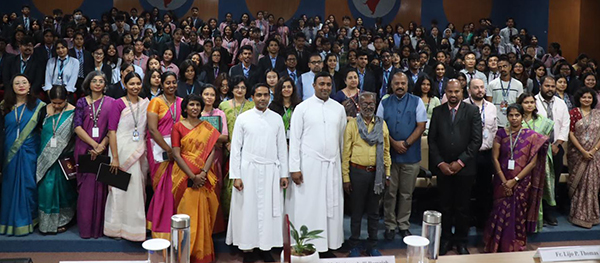
International Conference Health and Humanities: Exploring Uncharted Terrains in Literary Paradigms
Date: 24 & 25 January, 2024
The Department of English, Kristu Jayanti College, Autonomous, hosted an international conference titled “Health and Humanities: Exploring Uncharted Terrains in Literary Paradigms” in collaboration with Bryant University, Rhode Island, USA, and Bangalore Baptist Hospital, Bengaluru on 24th and 25th January 2024.
Fr. Dr. Augustine George, Principal of Kristu Jayanti College, rendered the Presidential Address highlighting the relevance of humanities in the narratives of health, healing and well-being. Dr. R. Spurgeon, Director & CEO at Bangalore Baptist Hospital, Bangalore, delivered the Inaugural Address on Building Empathy in Healthcare: Lessons from the Humanities. His speech emphasized the importance of empathy that creates positive impact in Healthcare. The event also marked the Conference Book Release by Dr. Deepthiman Gowda, Director of Clinical Practice at Columbia Narrative Medicine and Assistant Dean for Medical Education at Kaiser Permanente Bernard J. Tyson, US along with the other dignitaries. Inaugural session also witnessed a felicitation address given by Dr. Veronica McCOMB, Academic Dean of Bryant University, Rhode Island, USA.
Dr. Deepthiman Gowda, delivered the Keynote Address inculcating various case studies that focused on the importance of Narrative Medicine. Followed by engaging sessions with various noteworthy speakers, Dr. Sangeetha Menon, Professor & Dean, National Institute of Advanced Studies, Indian Institute of Science Campus, Bengaluru, Dr. Upreet Dhaliwal, Former Director Professor of Ophthalmology, University College of Medical Sciences, Delhi, and founding member Health Humanities group, UCMS, Mr. Ravi Ramaswamy, Facilitator & Trustee, Centre for Community Dialogue and Change, Dr. Piyusha Majumdar, Associate Professor, IHMR-U Co-Principal Investigator, STRIPE project Johns Hopkins University, WHO Jaipur, Dr Deepali Mallya Researcher, Academician and Content writer and others who spoke on the same. The Panelists for the conference were Dr. Dominic Benjamin, Head- Geriatrics, Bangalore Baptist Hospital, Dr. Sebastian Payyappilly, CMI, Director of the Institute of the Oriental Canon, Law, Ms. Anjana Nair, Nutrition and Wellness Industry, Consultant & Author, and Dr. Vigraanth Bapu K G, Programme Coordinator (PG), Department of Psychology, Kristu Jayanti College, illuminated on ‘Ethical Dimensions of Humanistic Narration in Healthcare Experiences’.
There were 3 Offline Mode Paper Presentation Sessions and 14 Online Mode Paper Presentation Sessions took place in A1 Auditorium and Online platform. Finally the Best Paper Award was given by Fr. Joshy Mathew, Head, Department of English, to Dr. Barnali Saha, Assistant Professor, Vivekananda Institute of Professional Studies. Totally 177 paper presenters presented their papers.
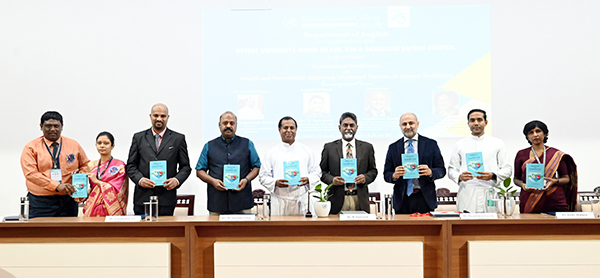
National Conference: Cityscapes: Interstices of Space and Memory Retelling Metropolitan Chronotopes
Date: 09 & 10 November, 2023
The Department of English organised a dynamic two-day National Conference on 9th and 10th of November 2023 themed "Cityscapes: Interstices of Space and Memory Retelling Metropolitan Chronotopes." The event commenced with an inspiring Presidential Address by Principal Fr. Dr. Augustine George and an evocative Inauguration Address by Tenzin Tsundue, a Tibetan Poet, Writer, and Refugee Activist. A thought-provoking panel discussion on Cities and Memory Studies featured expert resource persons Dr. Avishek Parui from IIT Madras, Dr. Padma V. McKertich from Stella Maris College, and Dr. Amir Bashir Bazaz from the Indian Institute for Human Settlements .The diverse paper presentations showcased insights from across states, delving into the intricate relationship between urban spaces and collective memories. Two engaging afternoon workshops explored sacred geography led by Dr. Nimeshika Venkatesan and the historical soul of Bangalore guided by Ms. Roopa Pai. This intellectually stimulating conference not only contributed to academic dialogue but also celebrated the fusion of space and memory in metropolitan landscapes.
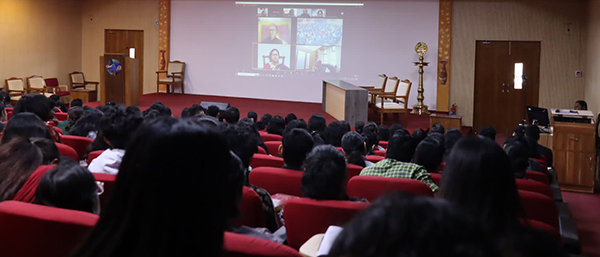
International Conference - Humanities in the Digital Age: New Directions and Emerging Trends
Date:March 29, 2023
The Department of English, Kristu Jayanti College (Autonomous) Bangalore, organized the Virtual International Conference on Humanities in the Digital Age: New Directions and Emerging Trends on 29th and 30th March 2023. A lineup of six international and five Indian experts engaged in dialogue around directions and trends in the burgeoning field of Digital Humanities. The sessions revisit a wide range of research areas such as Memory Studies, Human Rights, Spatial Humanities, Digital Writing, Accessibility, Gender and Activism, and Electronic Literature viz-a- viz its intersections with Digital Humanities.
The conference was inaugurated on the 29th of March, with the welcome address, felicitation, and prelude delivered by Rev. Fr. Joshy Mathew (Head, Department of English and Prof. AV Gopakumar (Dean, Humanities and Social Sciences) and Prof Jerrin Jose (coordinator, UG English, in the order of precedence. The Presidential address was delivered by Rev. Dr. Augustine George, Principal, of Kristu Jayanti College. Emphasizing the need for a paradigm shift in interdisciplinary research. The Inaugural Address was delivered by Paul Arthur, the Vice-Chancellor’s Professorial Research Fellow, and Chair in Digital Humanities and Social Sciences, in the School of Arts and Humanities at Edith Cowan University, Western Australia.
This was followed by seven plenary sessions. On the first day, three sessions were held and on the second day, there were four sessions. The sessions were efficiently organized by the college and the list of speakers comprised of both national and international level intellects. In the afternoon between 2. pm to 3. pm, there were various participants who actively presented their papers on Digital Humanities. The paper presentations were conducted in online mode on both days with eminent professors from the college chairing parallel sessions. There were 47 internal paper presenters and 58 external paper presenters.
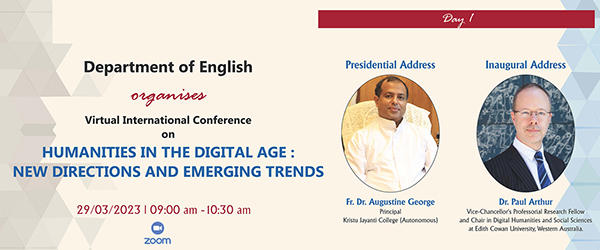
“Mad Woman In The Attic”: Exploring Thematic Concerns
Date:April 15, 2023
A Seminar on “Mad Woman in the Attic”: Exploring Thematic Concerns was organised for the students of VI BA JPENG A, JPSENG, and JEENG on 15th April 2023 at P1 Auditorium. The Seminar was divided into two sessions: the first session from 9.00-9.50 am and the second session from 10.00-10.50 am. In the 1st session, the students were given a detailed analysis of the novel Wide Sargasso Sea by Jean Rhys. The 2nd session consisted of deliberations into the various thematic and theoretical concerns found in the book by critics over the years.
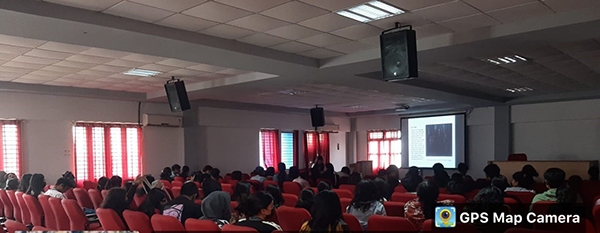
Virtual National Conference on Inclusivity Through A Transdisciplinary Prism
Date:January 24 and 25, 2023
The department of English organised a two-day Virtual National Conference on the 24th &25th of January, 2023 through the Zoom platform. The conference commemorated the International Day of Education, designated by the United Nations. The chief guest for the inauguration was Prof. H. S. Shivaprakash. The conference’s inaugural session commenced with the invocation by the College Choir followed by Prof. Jerrin Jose, Coordinator for UG and Conference Convener, welcoming the gathering. Dr. Saranya Narayanan, Assistant Professor, Department of English and Conference Convenor, delivered the prelude to the conference. This was followed by the presidential address delivered by Fr. Lijo P Thomas, Vice Principal and Chief Financial Officer, Kristu Jayanti College (Autonomous) where he emphasised the importance of inclusivity and appreciated the aptness of the theme on the International Day of Education. Ms. Alna Maria Isaac introduced the chief guest, Prof. H. S. Shivaprakash, a famous poet and playwright, and Sahitya Akademi Awardee, highlighting his achievements and works. The author traced back to the history of education and the contribution made by many educationists in the country, from the colonial period to the modern technological or digital era. Dean of Humanities Dr. Gopakumar AV gave his felicitations. The inaugural session concluded with a vote of thanks proposed by Dr. Lyola Thomas.
A total of 120 papers were presented at the conference.
Keynote Address- 1
The keynote speaker for the session was Dr Hemachandran Karah, Associate Professor at the Department of Humanities and Social Sciences, Indian Institute of Technology Madras, Chennai. He shared his valuable insights into inclusivity. The challenges he faced, the diverse experiences he had, and the example he set in front of the world. He discussed tokenism, inclusivity as a marketing strategy, problems, and side effects of inclusivity. He suggested reflecting on the inclusive learning courses through which students could be empowered and include informal strategies in teaching.
Panel Discussion - 1 Realising Inclusive Education: Issues, Challenges, and Prospects
The keynote address was followed by the panel discussion from 11.00 AM to 1.00 PM. The panel discussion was initiated by the moderator, GM Joseph Dunston, Director for development and Prof of English, St. Jerome’s college, AN Kudy Nagerkoil, Tamil Nadu and he emphasised on equality in education and inclusivity which is also part of the NEP chapter 6 and 14. The first-panel speaker, Ms. Santhya Vikram, Managing Director, Yellow Train School Coimbatore, Tamil Nadu, in her topic entitled The Yellow Train Approach to Inclusion focused on inclusive education: practices of inclusion in schools, the role of movement, and art as fundamental to the curriculum. Following her Dr. Candida Preetham, Founder Director, MANNA Development Disability Center, Bangalore, explained the barriers to Integrated Education of Disability Children. She further highlights the need for early intervention of special children, challenges, prevailing attitudes, the structure of health, and lack of access to buildings which are often results of poverty and deprivation. The third speaker, Dr. Pranav Arwari, Simple Education Foundation, New Delhi, spoke on the topic, Inclusive Education: Importance of Sexual Orientation which is an important aspect of inclusivity. Dr. Pranav stressed the issues faced by many teenagers and how they struggle to define their identity as queer identity. The panelist agreed that inclusive education is a right for all.
Panel Discussion- 2 on Transdisciplinary Policies and Practices for Inclusion
On the second day of the conference, the 25th of February 2023, a panel discussion was held on the topic of Transdisciplinary Policies and Practices for Inclusion at 9 a.m. through the Zoom platform. Dr. S. V. Srinivas, a Professor at the School of Liberal Studies, Azim Premji University, Bangalore moderated the discussion. The panel members were Dr. Susan Deborah, Assistant Professor and Teacher In-charge, Department of English, M. E. S. College of Arts & Commerce, Goa; Ms. Sapna Kedia, Assistant Director, Gender and Social Development, International Center for Research on Women (ICRW); Dr. Shivapriya Ganapathy, Independent Researcher, and Mr. Bhaskaran, Rtd. Deputy Director General from Ministry of Statistics, Government of India, Bangalore. In her presentation, Dr. Susan Deborah highlighted the importance of humanities scholars engaging in the discourse about climate change. Based on her work in ICRW, Ms. Sapna Kedia, the second panelist, spoke on the oft-neglected subject of men and masculinities. She pointed out that masculinity is not a homogenous identity but is intersectional and elaborated on how patriarchy restricts and conditions the behavior of men and even nonbinary people. The third panelist, Dr. Shivapriya made an important observation about the gap between what is taught and what is practiced in educational institutions. She noted how the term “inclusion” is itself symptomatic of structural problems in society since it predicates the difference between the self and the other: on who includes and who is included. Mr. Baskaran, the other panelist, insisted in his presentation that inclusion at a policy level must rely on a data-backed approach, citing the census figures on several important development parameters such as literacy rate, and infant and maternal mortality rate. In the ensuing discussion, Dr. Srinivas also emphasized the need for quantitative thinking to engage with important social questions.
Keynote Address - 2 on Attempting Inclusive Co-Creation in the Neo-Liberal University
The second day also included the second keynote address in the afternoon between 2.00 PM to 3.00 PM. The speaker for the Keynote Address -2 was Dr. Rosi Smith, Lecturer in Education Studies, De Montfort University, Leicester, United Kingdom. Dr. Smith presented on the topic “Attempting Inclusive Co-Creation in the Neo-Liberal University”. She provided a brief idea of the project she has undertaken for the last couple of years and the barriers her team faced. The overview of the project is to redesign the Special Educational Needs and Disability Module on our BA Education Studies. The objective of the project was to use sociological, psychological, and another kind of pedagogical approaches to help the differently abled. Her talk gave new insight into co-creation and co-production
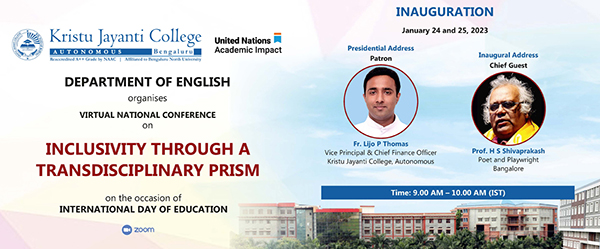
National Conference on Gender and the New Normal: Realities and Representations
Date:February 17 and 18, 2022
The Department of English, Kristu Jayanti College (Autonomous), Bengaluru organized a Virtual National Conference on ‘Gender and the New Normal: Realities and Representations’ on February 17 and 18, 2022. In his Presidential Address, Rev. Fr. Lijo P Thomas, Financial Administrator, Kristu Jayanti College, lauded the efforts by various committees in the college towards gender parity and wished the participants to have the desire for devout research.
The Inaugural Keynote Speaker was Ms. Betsy (Elizabeth) Birmingham, Professor of English, Professor of Social Justice, Dean of Social Sciences and Humanities, Lakehead University, Canada. Ms. Birmingham deliberated on the topic 'Covid Impact on Women in Higher Education Careers: Burn Out, Drop Out, and Fall Out'. With the aid of statistical data, Ms. Birmingham addressed the issue of enrolment depreciation and drop out of indigenous students. Her elaboration had some solutions to overcome the challenges of females in higher education due to the pandemic. Change in cultural attitudes and in institutional approaches, providing mentorship, clarity in data collection, supporting team research and aiming for equity not equality, are some of the ways through which female drop-out rates from higher education could be curtailed.
The two-day national conference brought together Activists, Writers, Professors, and Academicians across the globe to deliberate on gender realities and representations. Panel Discussion I on February 17, 2022, was titled 'Gender Experiences of the Pandemic: The Ground Reality' and Panel Discussion II on February 18, 2022 deliberated on 'Impact of the Pandemic on the Art and Artists'.
53 paper presentations on various subtopics related to Gender and the New Normal were held simultaneously in 10 parallel sessions over the two days of the conference.
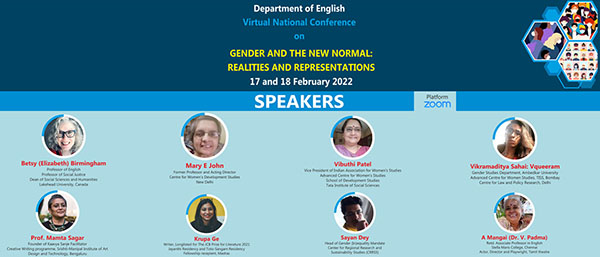
International Conference on Ecosystems in the Poetics of Experience
Day 1
On the occasion of International Mother Earth Day-April 22nd 2022, the Department of English (PG) Kristu Jayanti College conducted an International Conference titled, ‘Ecosystems in the Poetics of Experiences’. A prelude to the conference was delivered by Fr. Joshy Mathew, the chief convenor of the conference. Reiterated Kristu Jayanti’s status as the designated UNAI SDG Hub 1 and its various efforts and focus towards sustainability. Mother Earth speaks to you through every flower quoted the Conference Convenor Dr. Lyola Thomas, inviting Rev. Father Principal, Dr. Augustine George to deliver the Presidential address. Fr. Principal spoke about the integrated development of mind, body and spirit through humanities and how we could relate with nature. He also shed light on the significance of ecosystems and conveyed the significance of this conference due to accelerating climate change. The Chief Guest, Dr. Alfred Gathorne Hardy in his inaugural address shared an anthropomorphic story about bumble bee species, emphasizing on the conditions of climate change. He also laid stress on the importance of humanities in communicating awareness about conservation of ecosystems.
Dr. Lee F Ball, the Keynote speaker spoke about his experience of introducing sustainability as part of the academic curriculum in Appalachian State University. He spoke about the importance of activism, indigenous culture and his journey through arts and music aimed at inspiring people to remain connected with nature. He concluded with some intriguing insights to conserve environment, such as, forest bathing and the idea of a campus as a forest.
In the Plenary session I, the first speaker, Dr. Danilo C. Diotay, advocated the use of green technology to mitigate the detrimental effects of human activity and elaborated on the ESD for 2030 by UN.
In the Plenary session II, Lina Vincent, engaged the participants with a visual presentation of various artworks to stress on the importance of art in creating ecological awareness, enumerating on how artists are creating sustainable products and art works using waste materials.
The sessions had more than 160 participants.
The day concluded with several parallel paper presentations.
Day 2
The second day of the international conference, ‘Ecosystems in the Poetics of Experiences’, commenced with a prayer song by the college choir. In the panel discussion, titled, ‘Earth Perspectives for a Better Tomorrow’, four panel members exchanged their ideas and intriguing experiences. Mr. Leo Saldanha, the Founder – Trustee of the Environment Support Group, was the moderator of the session. The esteemed panel members were Dr. R. Vasudeva, Professor in Forest Biology at the College of Forestry; Mr Thorsten Skillgen, faculty from Germany; Francis Xavier, Agricultural Ecologist and Chandni Doulatramani, an independent journalist, pursuing masters from University of London.
After the welcome address, the moderator undertook the panel discussion. In his introductory remarks, he spoke about the intensity of devastation of forests, and due to the dying forests, he conveyed that creation of lives by the planet is reducing, hampering ecosystems. To increase awareness, he discussed the history and significance of Earth Day, continuing to recognize the nurturing qualities of our planet. Excess consumption, wars and capitalist developments, were enlisted by him as having damaging consequences for our ecosystems.
The first panellist, Dr. Vasusdev presented his lecture on ‘Saving Myristica Swamps of the Western Ghats: Forests of the Dinosaur Era’. His insights on critical importance of myristica swamps echoed a note of concern for mother nature. He attributed it to the swamps for making the river perennial by performing like a giant ecological sponge. He stated that about 85 percent of the swamps have stopped performing their ecological functions and with his team, he has been making efforts to restore them. He also suggested some ideas for the audience in the conservation of the planet, such as, seed ball preparation, tree plantation, using less papers and tissues.
The second panellist, Thorsten Shildgen, reflected on events from his childhood to convey the transition in lifestyle, food quality and nature in all together. His concern for saving the environment was articulated through his suggestions of consuming less electricity and opting for a more balanced life devoid of electric gadgets. He opined that people have withdrawn from nature due to urbanisation which is a prime reason for depleting ecosystems.
Francis Xavier’s speech was oriented towards the younger generation on whose shoulder lies the responsibility of protecting the nurturing, Earth. He continued the stream of thought on the need for conserving forests and mentioned that only 3.04 percent of total geographical area is forested. He expressed his concern through a focussed talk on choosing a more proactive policy of refuse, reduce and using recycled products.
Chandni Doulatramani’s talk catered towards the policies adopted by international governments to combat climate change. She shared her experiences about Denmark’s effort to become carbon neutral country during her visit. She conveyed that some nations have been adopting innovative ways to deal with the climate crisis, for instance, Copenhagen has food stalls made out of shipping containers and upcycled products. She also acknowledged Auroville’s efforts in becoming a self-sustaining community and its active participation into composting. She proposed that stopping food waste by us is an essential step towards becoming more responsible towards our planet.
Mr. Leo Saldanha as the moderator of the panel and other panellists responded to the questions of the participants.
The conference ended with several parallel paper presentations.
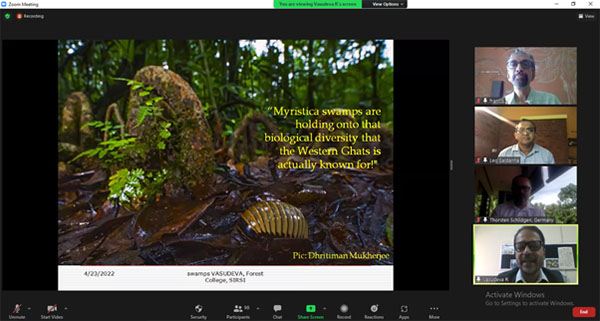
National Conference on “The Story: Life Narratives of Experience, Memory, Identity and Agency”
Date: 25th & 26th March 2021 | Time: 9:30 – 4:30
Topic: “The Story: Life Narratives of Experience, Memory, Identity and Agency”
Name and Details of the Inaugural Keynote Speaker:
Dr NandiniSahu, Indian Poet, Creative Writer and Academician
Number of Participants: 174 Registered Participants & Students of Kristu Jayanti College
The Department of English (UG), Kristu Jayanti College, organized a National Conference on “The Story: Life Narratives of Experience, Memory, Identity and Agency” on 25th& 26th March 2021.
The session commenced with an invocation song by the college choir, followed by the Welcome Address by Prof Jerrin Jose. The Prelude to the conference was delivered by Dr Lillykutty Abraham. In his Presidential Address, Rev Dr Augustine George, Principal, Kristu Jayanti College, gave insights on life narratives as a medium for identity and survival. The Chief Guest was introduced by Prof Alna Mariya Issac.
The inaugural Keynote Speech by Dr Nandini Sahu was an enriching academic experience. She stressed the importance of life writing along the lines of creative writing with snippets from her own career as a writer. The Inaugural Session ended with the Vote of Thanks delivered by Dr Masilamani C.
Eminent scholars and academicians chaired the Plenary Sessions on both the days of the conference. The Plenary Session I titled “Testimonios as Social History” was delivered by Dr T Marx, Professor, Department of English, School of English, Pondicherry University. He inspired the participants with his comprehensive and insightful session on the trajectory of social history in shaping testimonios.
Dr N P Ashley, Assistant Professor, Department of English, St Stephen’s College, Delhi, handled the Plenary Session II with the pertinent topic “The Great Indian Maid: Lives, Stories and the Problematic of Domestic Work.” He delineated on how internalisation of violence takes place in the society.
Dr Sreenath Muraleedharan K, Assistant Professor (Sr Gr) and Research Guide, Department of English and Languages, School of Arts & Sciences, Amrita Vishwa Vidyapeetham, Kochi, addressed the participants in the Plenary Session III on the topic, “Writing Travel, Writing Life: Tracing Trajectories of Self”. He spoke about how Travel Narratives are an important area in the realm of Life Narratives by referring to significant and acclaimed life narratives such as Varthamanapusthakam by Mar Thoma Kathanar and C K Janu’s autobiography Mother Earth.
The resource persons for the Panel Discussion on “The Discourse of Life Narratives: A Dialogue” were Dr Rani P L (Associate Professor and Head, Sri Satya Sai Institute of Higher Learning, Anantapur Campus, Andhra Pradesh), Dr Preeti Kumar (Assistant Professor, St. Teresa’s College (Autonomous), Ernakulam, Kerala), Dr. Prayer Elmo Raj (Assistant Professor, PG & Research Department of English, Pachaiyappa’s College, Chennai). The session was moderated by Dr V P Krishna Prabha. The discussion addressed key areas of Autoethnography, Biography and Biopics.
More than a 100 paper presentations on various topics related to life narratives were held simultaneously in 9 panels over the two days of the conference.
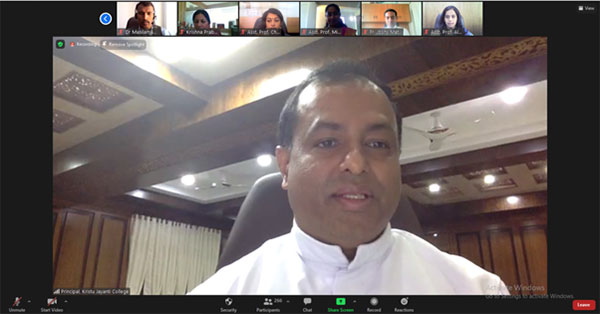
National Conference on Cultural Crossings: Diffusing Borders
The fourth national conference was organized by the Department of English (PG) of Kristu Jayanti College under the title Cultural Crossings: Diffusing Borders. It was the first national conference conducted on a virtual platform and it brought together research scholars and paper presenters from all across India.
Cultural Crossings shatter differences that divide the human race and the conference conducted by the Department of English (PG) called for a dissolution of the borders that separate cultures through discussions bringing together the newfound explorations in Social Sciences and Humanities to arrive at new perspectives that challenge and blur the boundaries that separate communities from one another.
Dr. Krishnaprabha V.P, Head of Department, English (PG) welcomed the Chief Guest, Justice P.S Narayana, author and judge, and the Keynote Speaker, Prof. Joseph Bathanti, Poet Laureate and Award-Winning Author, along with other guests. In the prelude to the conference, Dr. Krisna Prabha V.P elaborated that the aim of the conference is to address the multiplicity of analytical methods in cultural studies.
In the presidential address that followed, Principal Rev. Dr. Augustine George spoke about how respecting the culture of the other has become the need of the hour and emphasized the commitment of the college need to build humanity through an education that inculcates a celebration of the uniqueness of cultures.
The Chief Guest of the Conference, Justice P.S Narayana, Former Judge of High Court of Andhra Pradesh and author of a hundred and eighty books, was introduced by Conference Convenor Dr. Lyola Thomas. The Honorable Justice P.S Narayana spoke about the interrelatedness of culture and ethics. He gave examples from his own experiences with the Indian judiciary and the slender divisions between diverse expressions of culture, tradition, civilization, customs, practices, caste, religion, politics, nationalism, internationalism, regionalism, minority rights, linguistic groups and the like. He asserted the importance of language as a key element in the understanding of culture and the promotion of cultural harmony. There were about 330 participants in the session.
Prof. Stephen I, Conference Convenor, delivered the vote of thanks that marked the end of the inaugural session. The keynote session that followed immediately included the keynote address setting the theme of the conference by Prof. Joseph Bathanti, Poet Laureate, author and professor at Appalachian State University, North Carolina. He narrated the unpopular history and the progressive pedagogy of Black Mountain College that made it the first institution in the Jim Crow south state of North Carolina to admit a student of colour Alma Stone Williams in 1944.
Dr. Rajesh Sharma, Professor and Head, Department of English, Punjab University, Patiala in the plenary session that succeeded gave a brief introduction to cultural studies and Raymond Williams. The factors that affect research conducted in the field of cultural studies was discussed and he shed light on the problems of thin reading and the problems of “presentism”, stating that “cultural studies is paralyzed by the present”.
The paper presentation session conducted on two days was chaired by Dr. Krishna Prabha, Prof. Stephen, Prof. Susan and Dr. Lyola Thomas included presenters from various states, verbalizing perspectives on a range of topics from ethnocentrism, nationalism, new-age learning, aestheticization of culture, coffee movements, Adventist sub-culture, OTT platforms, teacher education, emotion and many more explored from a literary lens.
The conference disseminated unrevealed knowledge about the interrelatedness between culture, education, language and psychology, heightening cultural awareness in the participants, presenters and organizers. The conference thus ended on a very successful and transformative note
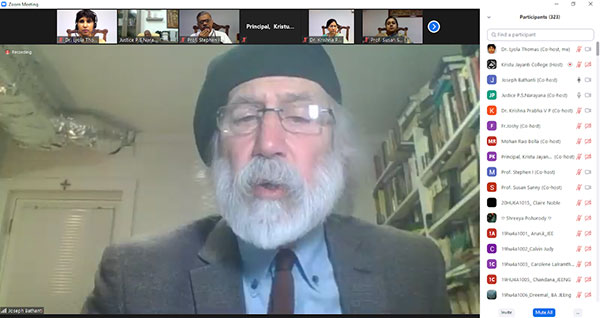
The Department of English (UG), Kristu Jayanti College organised a National Conference on "Language and Landscape: Perspectives on Man, Nature and Animals on 27 Jan 2020. Dr. Lilian Jasper, Dr. Dunston Joseph and Dr. Kaveri Nambesan were the resource persons. The conference commenced with an inauguration followed by keynote address by the resource persons and Paper presentations by students and faculty members from various colleges across India.
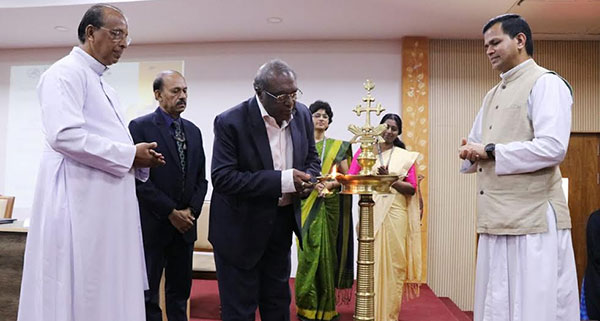
Webinar on The Cry of Africa: Postcolonial Bioregionalism in Wole Soyinka’s Plays
Class & No. of Students: 56, 1st and 2nd MA EL.
Date: 15. 09. 2020
Objective: To brief students about the relation between post colonialism and bioregionalism.
Resource Person: Dr. Samuel Rufus, Asst Professor, MCC, Chennai
The Department of English (PG) hosted a webinar on September 15, 2020. The occasion was graced by Dr. Samuel Rufus, Assistant Professor, P G & Research Department of English, Madras Christian College, Chennai. It was held on the online platform of Zoom. with an active number of participants. Dr Rufus’s doctoral dissertation was on Post colonialism and he is a recipient of the University Gold Medal in MA English and Winner of the President Venkataraman Gold Medal for Academic Excellency.
Dr Samuel Rufus started off with the topic “How to approach Wole Soyinka’s ‘Dance of the forest?’ and ‘How to engage better with Wole Soyinka’. He mentions the author Wole Soyinka as a rebel, very-critical and that this can be seen in all his plays. He had given a brief introduction on Bioregional studies and how both Post-Colonialism and Bioregionalism come together in the interdisciplinary approach of Wole Soyinka. A Bioregional study is a pro-active approach. It is an offshoot of eco-critical studies, so it engages with nature like environmental studies does. The specialty about bioregionalism is that it celebrates the region, a bio-region in which the characters are placed. The region, in which we live, has been here for thousands of years. But these places are now ravaged and mutilated, that’s where eco-feminism also comes in. The women are compared to the land. The way in which a woman is destroyed is compared to the ways in which the environment is destroyed. The precious resources of the region are completely robbed. Dr. Rufus quoted Mother Teresa’s words “Instead of cursing the darkness you light a candle. This is the essence behind which bioregional studies are built. The aborigines were all connected with their region, a kind of personal bonding at the level of family. They call the river as brother, sea as mother, mountains as sisters. When the white colonial masters came, they had a binary division, nature v/s humans or nature v/s culture. He stated that nature was completely different in Wole Soyinka’s plays. “The Dance of the Forest” was played in the eve of Independence Day of Nigeria in 1960. He quoted Chinua Achebe’s words that “Unless the lions have their own historians, the history of the hunt will always glorify the hunter”.
Dr. Rufus elaborated on the way to approach Wole Soyinka’s “Dance of The Forest” using a bioregional perspective. That is, how nature connects with the individual and how they together weave a society. There was a Q and A session at the end of the lecture, where students asked question to the resource person. He stressed on the cosmic interconnectedness that the post colonial Bioregionalism celebrates. The writer always has a unique voice, it is the societies failure to hear the voice of the writer. He quoted Emerson and stated that “You’ve come into this world, not to be happy, but to be useful.”
Bincy Thomas, student, 2nd MA EL opined, “It was an enlightening session in which Dr. Rufus has explained Bioregionalism as a proactive approach celebrating the region, and she also mentioned that the webinar helped in understanding how bioregionalism and post-colonial studies are related.”
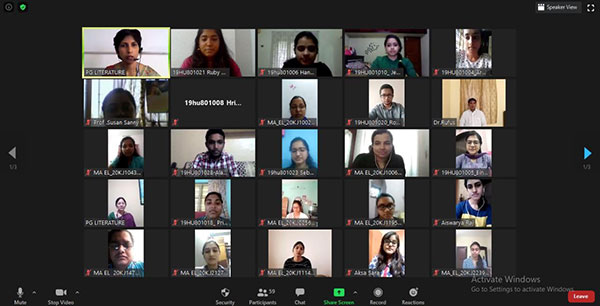
Webinar on Derrida and Deconstruction
A webinar titled “Derrida and Deconstruction” was organised by the Department of English (PG) on May 19, 2020. Dr. Joseph Dorairaj, Dean, School of English and Foreign Languages, Gandhigram Rural Institute, Tamilnadu was the resource person of the day.
Dr. Dorairaj discussed from the Semiotics of Saussure to the Deconstruction of Derrida. He started with A Course in General Linguistics by Saussure and explained the concept of Sign, containing the signifier and the signified, and explained the arbitrary relation between them. He also spoke about the concepts ‘Diacritical and Differential Identity’ and placed ‘Langue and Parole’ on the axis. He referred to the seminar conducted at the John Hopkin’s Humanities Centre in the year 1966 titled “The Language of Criticism and the Sciences of Man” where Derrida presented his paper Structure Sign and Play. The seminar served as the birth place of the deconstructionist Derrida.
Dr. Dorairaj went on to elaborate on the connection between Deconstruction and Post-structuralism. He quoted three scholars – Eagleton, Leitch and Barry and their individual understanding of Deconstruction and Post-structuralism. He explained a fourth view point which sees post-structuralism as an umbrella term which includes Post-colonialism, Post-modernism and Feminism, and deconstruction as its significant feature. He delineated on how Derrida with his theory of Deconstruction attacks the philosophical concept of Metaphysics, Phonocentrism and Logocentrism. He also explained the binary oppositions that exist, especially the binary opposition of speech and writing in which speech is privileged. He quoted thinkers like J. Hillis Miller and Paul de Man from their texts to explain the application of Deconstruction. He concluded the talk by explaining the act of deconstructing.
Prof. Qurshid Begum. R, Additional Dean, St. Joseph's College (Autonomous), Tiruchirappalli shared her experiences “I participated in the webinar on Derrida and Deconstruction. Listening to Dr. Joseph Dorairaj is always a great intellectual experience. I would like to congratulate the Management and the organisers for this meticulously planned and executed academic exercise. Wishing you the best in all your future endeavours!”
There were 500 participants across the country; they not only participated as an audience but also interacted with Dr. Dorairaj with enthusiasm.
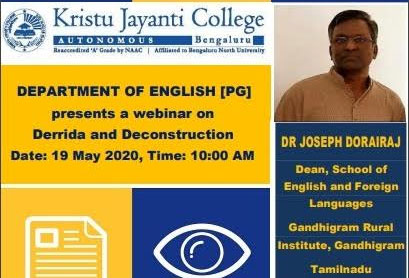
National Conference on Portrayals Of Probability
The Third National Conference was organised by the Department of English (PG) Portrayals of Probability on January 16, 2020.
Every idea holds a promise, a probability of thought. But as an idea it is yet a possibility…a mere probability. The conference hoped to set the stage and create a space where artists and academicians can come together to muse on their efforts to portray ‘the real’ and ‘the imaginary’, seeking after that ephemeral and evanescent Imagination, in a confluence of Literature and Art.
In the Prelude to the Conference, Dr. Krishna Prabha V.P., Head, Department of English (PG), elaborated on the topic Portrayals of Probability quoting Plato and Aristotle. She made the gathering aware about the emergence of the concept portrayals of probability which was birthed in the thought of Philip Sidney. She spelt out the ways of portrayals in art. She emphasized the role of poetry as universal truth. She made it clear that according to Aristotle, philosophy and poetry take to the avenues of great heights.
In the presidential address which followed, Fr. Josekutty P. D., our beloved Principal, gave a motivational and inspirational speech to the Department of English (PG) urging them to reach higher levels of achievement through relevant discourses of probability in literature.
The Department of English (PG) was proud to host the first ever Art Exhibition which was an integral part of the conference and was reflecting the very essence of the theme of portrayals of probability. The art gallery displayed 147 varieties of art forms which included digital art work as well. The objective behind the exhibition was to focus on the formal, thematic and rhetorical features that imaginative literature shares with texts in the history of probability.
In the keynote address, Prof. Sundar Sarukkai, an erudite scholar and philosopher, spoke about the various traditions of philosophy. One of the fundamental questions he posed on to was “what is really real.” Philosophy can be seen as a background for the deep understanding of the topic. He also elucidated that probability is not a manifestation of what we don’t know.
The first plenary session was addressed by Shri Giridhar Khasnis, an artist and art curator. The resource person presented five artists through short videos and showcased how profound art can be and in a deeper sense subverting reality through art.
In the second plenary session, Dr. Jai Singh, Assistant Professor, Department of Indian and World Literature, EFLU, gave us thoughtful insights and interpretive exegesis on musical renaissance, colonial discourses and orientalism.
Paper presentation which happened in the afternoon sessions saw researchers from different universities speaking on a wide range of topics such as performing arts, folklore, illustrations, art works and other art forms pertaining to probability in the light of literary works.
“The national conference along with the Art Exhibition was an excellent platform to showcase the creative genius of the students. The art exhibition has given the students plethora of knowledge about miscellaneous art works and artists. The scattered glass pieces exhibited in the art gallery showed the ‘portrayals and probability’ of day to day life. It gave all an insight that we must not try to fit in, where we do not belong to, if we try, we will get hurt. Philosophically it taught us that don’t search reality when it doesn’t exist in reality” opined Anisha A, a final year student.
The conference led to spreading the light of awareness, paving a path of motivation and interest in the terrain of portrayals of probability in young minds.
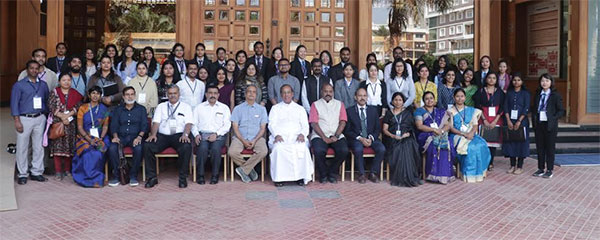
National Conference On Cartographies Of Diaspora And Displacements: Narratives Of Expatriates And Poetics Of Exile
The second National Conference was organised by the Department of English (PG) of Kristu Jayanti College under the title Cartographies of Diaspora and Displacements: Narratives of Expatriates and Poetics of Exile on 18 January 2019. The second edition was truly a step forward from the previous edition’s theme on Colonies and their significant global presence. Cartographies of diaspora is an important phenomenon that galvanises the interests of many social sciences, simultaneously. That the Department of English is hosting a conference on the theme is reflective of its role as a facilitator of globally pertinent discourses. Ms. Susan Sanny, Conference Convener, welcomed the Chief Guest Ms. Andaleeb Wajid, author, and the Keynote Speaker Dr. Etienne Rassendran, Professor, St. Joseph’s College, Bangalore, along with other guests. In the presidential address which followed, Principal Fr. Josekutty P. D. spoke about the importance of diaspora communities, their contributions to society and the need for good lessons of living purpose-driven lives to be imitated and appreciated. In the Prelude to the Conference, Dr. Krishna Prabha V. P., HoD, Department of English (PG), described different types of displacements and their importance in the political and socio-economic scene in the world today. She spelt out the agenda for the conference that it might create an awareness among scholars of the plights, capacities and dreams of the exiles, expatriates, refugees and the numerous diaspora.
The Chief Guest of the day, Ms. Andaleeb Wajid, the eminent author of eighteen novels based in Bangalore, spoke about her personal experience – of having had to define and explain her identity often because of being born in one place with which she still maintained familial and social connections but brought up and educated in another. The inaugural session ended with the Dr Arpita Ghosh thanking everyone for their valuable presence. In the keynote address, which was also the first technical session, Dr. Etienne Rassendran, Professor at St. Joseph’s College, Bangalore spoke about the need of demystifying the way in which diaspora is viewed; he spoke of diaspora population as fugitives, characterised by a loss and a longing. He equally underlined the idea of intersectionality of departure and arrival in the life of diaspora communities.
Panel discussion was a fruitful time of live interaction for the audience with the expert panellists. Constituted by Jennifer Sait, Dr K Paul Newman and Dr Mukunda Rao, the panel brought to the conference expatriate experiences, refugee issues and a plethora of narratives on diaspora. Each of the panellists had their own wealth of personal experiences to share with the audience.Paper presentation which happened in the morning and afternoon sessions saw presenters from seven universities and six states speaking on a wide range of topics pertaining to displacement, exile and migration in the light of literary works. The conference led to spreading the light of awareness, paving a path of motivation and interest in the terrain of diasporic experiences in young minds and old.
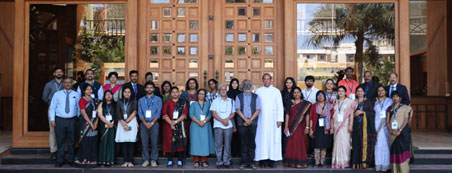
INTERNATIONAL CONFERENCE ON REFLECTIONS AND REFRACTIONS ON (DIS) ABILITY- INTERDISCIPLINARY PERSPECTIVES
A two day International Conference was hosted by the post-graduate departments of the deanery of Humanities, namely English Literature, Psychology, Social Work and Journalism and Mass Communication. People with disabilities have been a neglected community and the most rational solutions to their problems can be brought about only through a multi-disciplinary approach. Dr. S. K. Prasad in his inaugural address gave valuable insights into the legal support the Indian Government has framed to support persons with disabilities. Keynote speaker Dr. Malavika stressed on how the nature of the child is usually misunderstood and that there should be a paradigm shift to a democratic learning environment that uses inclusivity. The first plenary session led by Prof. Thomas Abraham discussed how the mainstream media portrays persons with disabilities as either heroes or mere objects of sympathy. Dr. Roopesh in his second plenary session discussed at length the various disabilities, its characteristics and how it can be treated. Dr. Benny spoke about how inclusive education can bring about a change and illustrated speech with practical examples from his life as a counselor.
Day 2 of the conference started off with the fourth plenary session in which Dr. Lovelina discussed the various approaches that a social worker should undertake while dealing with the disabled people. The fifth and the last plenary session led by Prof. Shiva Rama Krishna who spoke about super-consciousness that can lead them through difficult times. The most vital aspect of the second day was the paper presentations that took place at three venues simultaneously. A wide range of topics were covered under different disciplines and saw active participation from the students of English Department as well. A panel discussion was also held, in which various aspects like technological aids for the disabled was discussed. Two students also shared their personal story towards success despite health and fate failing them. Two days brimming with knowledge came to an end with the valedictory in which Dr. A Radhakrishnan Nair appreciated the collective effort of the four departments in throwing light upon a topic which is very relevant in today’s world. The biggest take away for the students from the conference was the realization that the actual disability lies in the attitude of the society.
ABILITY.jpg)
National Conference On Cartographies Of Diaspora And Displacements: Narratives Of Expatriates And Poetics Of Exile
The second National Conference was organised by the Department of English (PG) of Kristu Jayanti College under the title Cartographies of Diaspora and Displacements: Narratives of Expatriates and Poetics of Exile on 18 January 2019. The second edition was truly a step forward from the previous edition’s theme on Colonies and their significant global presence. Cartographies of diaspora is an important phenomenon that galvanises the interests of many social sciences, simultaneously. That the Department of English is hosting a conference on the theme is reflective of its role as a facilitator of globally pertinent discourses. Ms. Susan Sanny, Conference Convener, welcomed the Chief Guest Ms. Andaleeb Wajid, author, and the Keynote Speaker Dr. Etienne Rassendran, Professor, St. Joseph’s College, Bangalore, along with other guests. In the presidential address which followed, Principal Fr. Josekutty P. D. spoke about the importance of diaspora communities, their contributions to society and the need for good lessons of living purpose-driven lives to be imitated and appreciated. In the Prelude to the Conference, Dr. Krishna Prabha V. P., HoD, Department of English (PG), described different types of displacements and their importance in the political and socio-economic scene in the world today. She spelt out the agenda for the conference that it might create an awareness among scholars of the plights, capacities and dreams of the exiles, expatriates, refugees and the numerous diaspora.
The Chief Guest of the day, Ms. Andaleeb Wajid, the eminent author of eighteen novels based in Bangalore, spoke about her personal experience – of having had to define and explain her identity often because of being born in one place with which she still maintained familial and social connections but brought up and educated in another. The inaugural session ended with the Dr Arpita Ghosh thanking everyone for their valuable presence. In the keynote address, which was also the first technical session, Dr. Etienne Rassendran, Professor at St. Joseph’s College, Bangalore spoke about the need of demystifying the way in which diaspora is viewed; he spoke of diaspora population as fugitives, characterised by a loss and a longing. He equally underlined the idea of intersectionality of departure and arrival in the life of diaspora communities.
Panel discussion was a fruitful time of live interaction for the audience with the expert panellists. Constituted by Jennifer Sait, Dr K Paul Newman and Dr Mukunda Rao, the panel brought to the conference expatriate experiences, refugee issues and a plethora of narratives on diaspora. Each of the panellists had their own wealth of personal experiences to share with the audience.Paper presentation which happened in the morning and afternoon sessions saw presenters from seven universities and six states speaking on a wide range of topics pertaining to displacement, exile and migration in the light of literary works. The conference led to spreading the light of awareness, paving a path of motivation and interest in the terrain of diasporic experiences in young minds and old.

National Conference
With an aim to look into the richness and diversity of aboriginal and regional literatures produced during the post-colonial period, the first National Conference was organized by the post graduate department of English Literature on 23 January 2018 in the Amphitheatre, at Kristu Jayanti College. The chief guests, Ms. Shinie Antony and Ms. Meena T. Pillai were cordially welcomed by the conference convener Ms. Susan Sanny. There were participants from various institutions and universities across Bangalore and the audience was a rich heterogeneous mixture of the Jayantians. The Head of the English Department PG, Dr. Krishnaprabha painted a collage in the prelude to the conference. Her dissertation included a detailed explanation of what Aboriginal Literature actually meant. She traced the various aboriginal Literatures that included the African Literature. The prelude also kindled various questions regarding colonialism and post-colonialism. The conference was conducted successfully with a lot of interactive sessions that benefitted all those who were present.
National Conference on Narratives in Media and Literature
Department of Journalism and English organized a national conference on ‘Narratives in Media and Literature on February 7, 2017. Mr. Sugata Srinivasaraju, Co-Founder and Vice-Chairman, Sunohscapes Radio Foundation was the Chief Guest and the Dr. Etienne Rassendren, Associate Professor, St Joseph’s College, Bengaluru was the Guests of Honor; Ms. Andaleeb Wajid, Writer and Creative Facilitator, nut-cracker.in; Mr. Joshy Mathews, Communications Consultant and Trainer. The conference witnessed flocking of academicians and researchers with representation from 18 institutions, 43 participants from four states where 37 participants presented their papers in the conference on diverse topics related to media and literature. The conference was very useful as it was very interactive.
